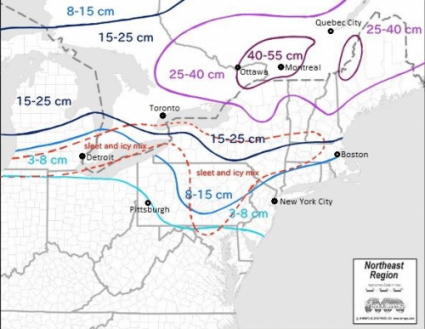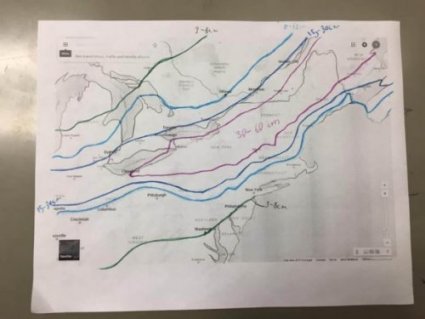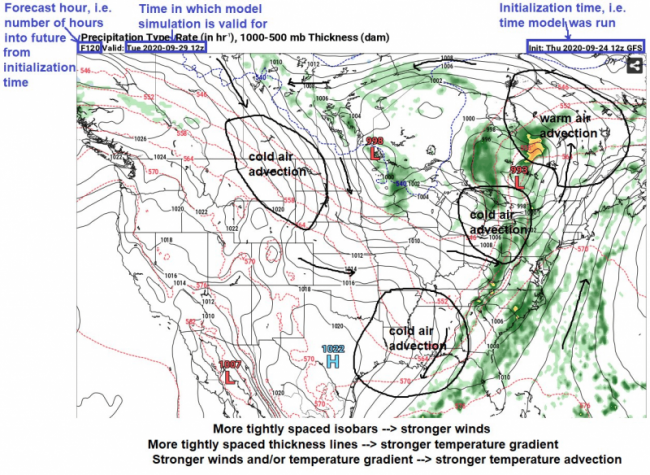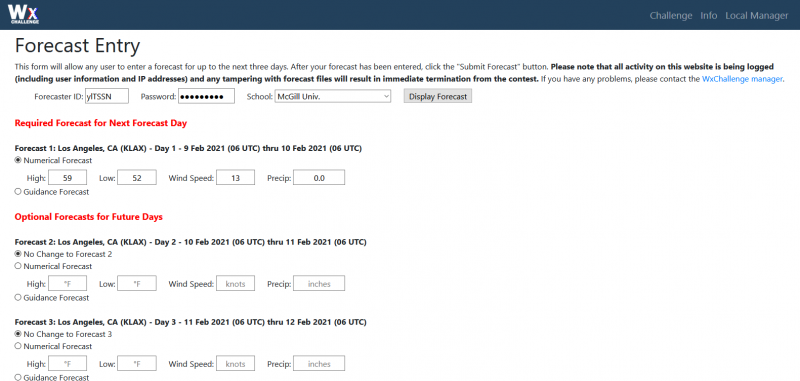
Le club étudiant de météorologie de McGill
– Par Yeechian Low and David Wang –
Si beaucoup redoutent les fluctuations constantes de températures, les blizzards et les orages violents, c’est une source d’excitation pour nous, les membres du Club de prévisions météorologiques (CPM) de McGill.
Le Club est composé d’un petit groupe d’étudiants qui souhaitent discuter de la météo et faire des prévisions. La plupart des membres sont des étudiants en sciences atmosphériques et océaniques (AOS), mais le Club accueille tous les étudiants qui s’intéressent à la météo. Les membres se réunissent chaque semaine pour discuter de divers concepts et outils météorologiques de prévision du temps dans le cadre du schéma météorologique actuel. Ces réunions se terminent souvent par des prévisions météorologiques de diverses natures faites par les membres. À titre d’exemple, certains ont proposé une simple prévision sur cinq jours pour Montréal, une carte des accumulations totales de neige pour le nord-est des États-Unis et le sud-est du Canada, une description détaillée et chronologique d’une tempête affectant Montréal, le risque d’orages violents et de tornades dans une région, la direction et l’intensité des cyclones tropicaux, les modèles météorologiques à long terme et même les prévisions saisonnières. En temps d’accalmie à Montréal, les étudiants discutent des événements météorologiques intéressants qui se produisent ailleurs dans le monde.
En outre, nous sommes plusieurs à avoir participé au WxChallenge, un concours de prévisions météorologiques entre étudiants et professeurs d’université en Amérique du Nord. C’est une excellente occasion d’appliquer les théories météorologiques apprises en classe, comme les différents facteurs contrôlant la température, dont l’advection de température, le rayonnement et le refroidissement par évaporation, pour faire des prévisions météorologiques dans un contexte réel. En classe, ces connaissances ne sont appliquées que dans le cadre d’exercices de scénarios théoriques et idéalisés.
Les meilleurs prévisionnistes pour chaque ville et pour l’ensemble de l’année scolaire reçoivent un trophée, et ces dernières années, plusieurs d’entre eux représentaient McGill. En effet, l’équipe a remporté un total de huit trophées l’année dernière (2019-2020), ce qui constitue un record d’équipe et un exploit impressionnant étant donné que nous ne comptions que six prévisionnistes.
L’expérience pratique en prévisions météorologiques que nous avons acquise au CPM de McGill est aussi importante que la maîtrise des théories apprises en classe pour réussir le WxChallenge et, à ce titre, être un membre actif du Club a été une aventure précieuse et enrichissante!
The McGill Student’s Weather Forecasting Club
– By Yeechian Low and David Wang –
While roller coaster temperatures, blizzards, and severe thunderstorms are dreadful for many, they are reasons for excitement for us, as members of the McGill Weather Forecasting Club (WFC).

The WFC is comprised of a small group of students who are interested in discussing and forecasting the weather. Although the great majority of members are students majoring or minoring in atmospheric and oceanic science (AOS), we welcome any student interested in weather into the club. We have weekly meetings where we discuss various meteorological concepts and tools for weather forecasting in the framework of the current weather pattern. These meetings are often concluded by the members making weather forecasts of diverse natures together. Types of forecasts include a simple 5-day forecast for Montreal, a storm-total snowfall accumulation map for the Northeast U.S. and southeastern Canada, a detailed description and timeline of a storm affecting Montreal, regional severe thunderstorm and tornado risk, steering and intensity of tropical cyclones, long-range weather patterns, and even seasonal forecasts. At times when the weather is calm in Montreal’s neck of the woods, we also discuss any interesting weather events around the globe.
Most AOS classes at McGill focus on the theory and equations behind how the atmosphere and ocean evolves. Other than one class formerly taught by Dr. Eyad Atallah, there is little or no class instruction on operational weather forecasting. Motivated by the interest of some AOS students, Kai Melamed-Turkish (AOS. B.Sc. 2017; M.Sc. 2020) started the WFC with the help of David Wang (AOS. M.Sc. 2014; Ph.D. 2019) and Anthony Di Stefano (AOS. B.Sc. 2016), the president of the Atmospheric and Oceanic Sciences Society of Undergraduates at McGill (AOSSUM). The WFC was intended to be an informal club where members could discuss weather events, track storms, and learn about weather forecasting. I (AOS. B.Sc. 2019) joined the club during my freshman year (Fall 2016) at McGill after learning about it from Kai in an introductory AOS course. Being very passionate about the weather, I knew this was the club for me. After Kai graduated in Spring 2017, David Wang and I co-managed the club, and I became the main leader after David Wang graduated in 2019. Due to the COVID-19 pandemic, I now run WFC meetings through Zoom, and David still joins in and helps me run the club in general.

Running the club has not only provided me with valuable experience in weather forecasting but also on how to break down and explain various meteorological concepts during the relatively short meetings, especially to members who are first-year or second-year undergraduate students with little experience in weather forecasting. It is a challenge to cater the club to students with different levels of familiarity in meteorology and having new members each year. Running meetings to account for this diversity in skillset has been a learning process!
At the beginning of each school year, I probe the new members’ familiarity with meteorology based on the AOS courses they have taken and if they have any prior forecasting experience to gauge what I should explain in more detail. The first few meetings are usually devoted to getting members up to speed with understanding and using tools used for weather forecasting. A major tool that we use to make weather forecasts is computer models. Getting comfortable with reading computer weather models, which involves understanding model initialization time, forecast hour, and the different variables shown, is one of the biggest hurdles for new members.

In addition, several of us in the WFC participate in the WxChallenge, a weather forecasting competition among university students and professors across North America. I am the local manager of McGill’s team, a role that goes well with leading the WFC. In the competition, each forecaster submits their forecast for daily high and low temperatures, maximum sustained wind speed, and total precipitation at a location in the U.S. that has routine weather observations. Unlike the forecasts we do during the WFC meetings, the WxChallenge forecasts are done individually. However, we often provide a short briefing about the current and future weather for the location of interest during our weekly meetings. The forecast location changes every two weeks. Five locations are used in the Fall and Spring semesters each.
The competition gives us more valuable opportunity to apply meteorological theories that we learn in class, such as different factors controlling temperature, including temperature advection, radiation, and evaporative cooling, to making real-world weather forecasts. In class, we were only able to apply this knowledge by doing exercises in theoretical, idealized scenarios. Looking at the forecast wind speed and direction, temperature, cloud cover, and precipitation from various computer models are also a major component in making WxChallenge forecasts. However, we do not directly take the model forecast variables as our WxChallege forecasts. Instead, we process model guidance with our prior forecasting experience and known model biases to derive our forecasts.

Top-performing forecasters for each city and the whole school year receive trophies and in recent years, several McGill forecasters have earned trophies! In fact, the team won a total of eight trophies last year (2019-20), which is a team record and an impressive feat given that we had only six forecasters.
Each location’s local weather is different and even those of us who are more experienced still often make mistakes and are always learning from them. The hands-on experience in weather forecasting we’ve gained from the McGill WFC is as important as learning the meteorological theories in class to succeed in the WxChallenge. All in all being an active member of the McGill WFC has been a valuable and enriching adventure!
Étudiants, Le club étudiant de météorologie de McGill, Météo